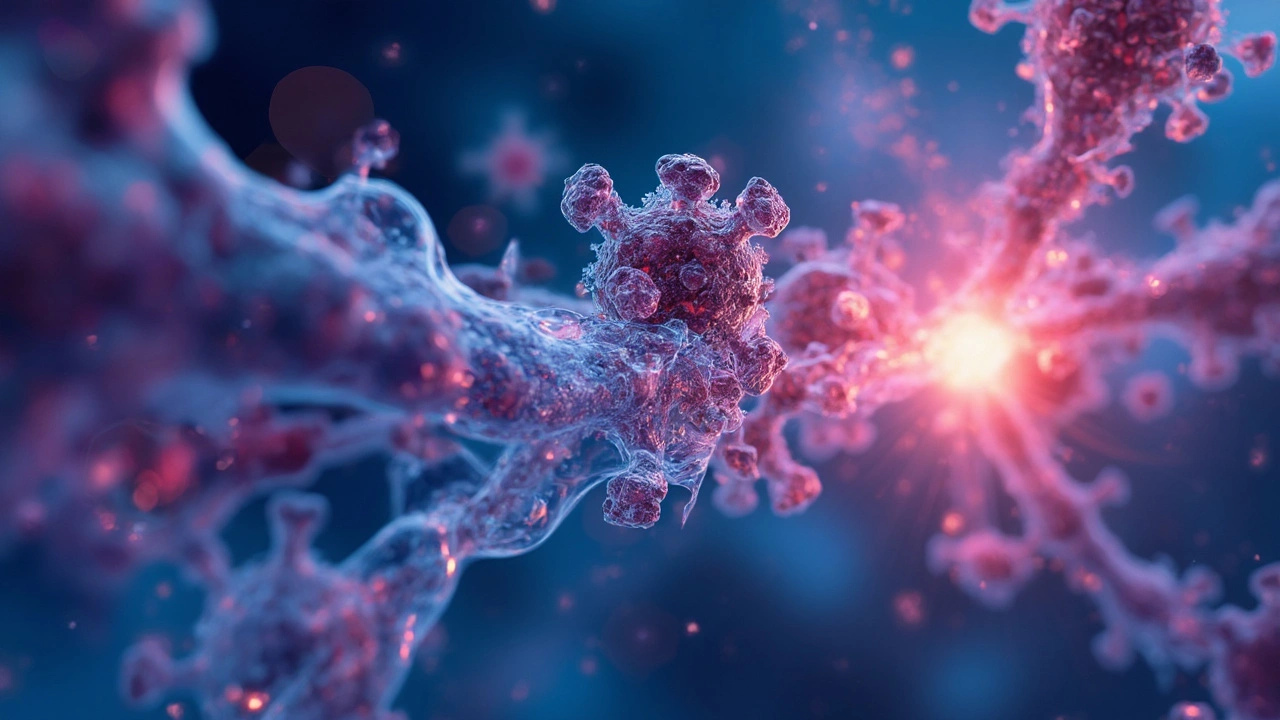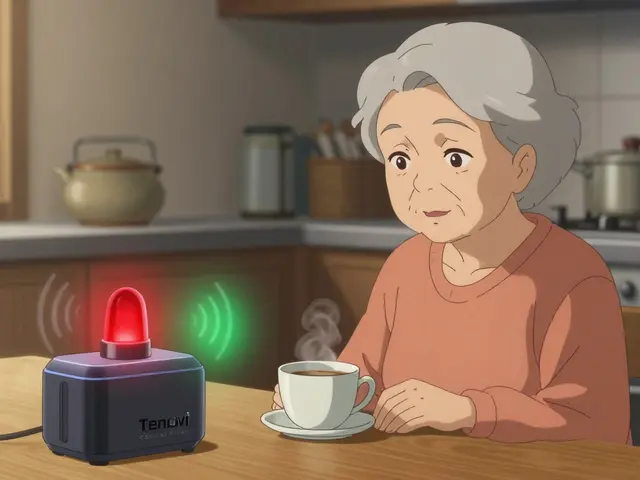First things first, exemestane is a medication that often crops up when discussing metastatic breast cancer, especially the hormone receptor-positive type. So, what makes this drug special? It’s classified as an aromatase inhibitor, which means it helps reduce estrogen levels. This is crucial because many breast cancers feed off estrogen to grow and spread.
Now, you might wonder why it's favored for treating metastatic cases. Well, exemestane is typically used after other treatments, like tamoxifen, when they’re not doing the trick anymore. It gives oncologists another line of attack, often extending patients’ lives or improving their quality.
There’s some compelling research backing exemestane, too. Studies show that it can delay the progression of cancer, which is a big deal for anyone dealing with this devastating diagnosis. Plus, it's an oral medication, making it more convenient for patients compared to IV therapies.
Understanding Exemestane
So, what exactly is exemestane? At its core, exemestane is a type of hormone therapy known as an aromatase inhibitor. It’s primarily used for treating postmenopausal women with metastatic breast cancer, helping to slow the cancer's growth by reducing estrogen levels in the body. Estrogen can stimulate the growth of hormone-receptor-positive breast cancer cells, so cutting its supply can be a game-changer.
Exemestane works by binding to the aromatase enzyme, which converts androgens (another kind of hormone) into estrogen in the body. By doing so, it slashes the production of estrogen, effectively ‘starving’ these cancer cells.
How is Exemestane Different?
Compared to other aromatase inhibitors, exemestane is a steroidal inhibitor, meaning it imitates natural hormones more closely. This can result in different side effects and interactions, which is why doctors might choose it over non-steroidal options like anastrozole or letrozole.
In the context of treatment plans, exemestane is often prescribed after the initial use of drugs like tamoxifen for early-stage cancer. It serves as a secondary line of defense for patients who no longer respond to those treatments.
A Closer Look at Use Cases
Breast cancer isn’t a one-size-fits-all scenario, and neither are its treatments. Typically, exemestane is recommended when the cancer has spread beyond the breast, hence the term ‘metastatic’. It offers patients the opportunity to manage their cancer when it reaches this critical stage.
| Usage Stats | Details |
|---|---|
| Metastatic breast cancer patients | Commonly used post-tamoxifen |
| Effectiveness | Shown to slow disease progression |
Remember, every treatment carries its own set of expectations and potential side effects, so having an open dialogue with healthcare providers is essential for anyone considering exemestane.
How Exemestane Works
Alright, let's dive into the mechanics of exemestane. Primarily, it targets breast cancer by cutting off its food supply. Many metastatic breast cancer cases are hormone receptor-positive, meaning they depend on hormones like estrogen to grow.
Exemestane is part of the aromatase inhibitors family. Here's what it does: it blocks an enzyme called aromatase. This enzyme usually helps convert other hormones into estrogen, especially in post-menopausal women. By blocking aromatase, exemestane lowers the overall estrogen level in the body.
The Science Behind It
Looking at it more scientifically, aromatase inhibitors like exemestane are selective, targeting only peripheral tissues like fat and muscles where estrogen is produced post-menopause. This is vital because these non-ovarian tissues are major estrogen sources in postmenopausal women. Without estrogen feeding them, cancer cells starve.
Why It’s Essential
Think of it as starving the enemy. This reduction in estrogen not only slows cancer's growth but can sometimes shrink cancerous tumors. Many patients find that exemestane can pause cancer progression where other treatments couldn't do the job.
Quick Glance at the Evidence
There's substantial research backing the use of exemestane. In clinical studies, patients consistently show improved outcomes, with increased survival rates and time to progression compared to those not using the drug.
Here's a glimpse of some statistics that highlight its impact:
| Outcome | Exemestane | Placebo/Other |
|---|---|---|
| Progression-free Survival | Median of 10.9 months | 6.7 months |
| Overall Survival | Increased by 34% | - |
In summary, while exemestane isn't a magic cure, its ability to cut off cancer's estrogen supply makes it a potent part of the treatment arsenal, offering hope and extended quality of life for many women fighting breast cancer.

Effectiveness and Benefits
When we talk about exemestane, we're delving into a treatment that packs a punch in controlling metastatic breast cancer. This medication is particularly effective for postmenopausal women with hormone receptor-positive cancer, which is a common subtype of the disease. But how effective is it really? Let's break it down.
Clinical Efficacy
Studies have demonstrated that exemestane significantly reduces estrogen levels, starving the cancer cells of one of their primary growth fuels. In one notable study, exemestane extended the median time to cancer progression by over three months compared to a control group, which is a significant boost in the oncology world.
Key Benefits
One major perk of using exemestane is its oral administration. Patients can take it at home, eliminating the need for frequent hospital visits for treatment, which can immensely improve quality of life.
- Convenience: Being a pill, it's easy to incorporate into daily routines.
- Tolerability: Compared to chemotherapy, exemestane tends to have fewer severe side effects, making it easier for patients to continue with their everyday lives.
- Proven Track Record: Clinical trials have consistently shown that exemestane is effective at slowing disease progression.
Statistical Insights
For the data buffs, here’s how exemestane stands in numbers:
| Outcome | Exemestane Group | Control Group |
|---|---|---|
| Median Progression-Free Survival | 10.9 months | 7.4 months |
| Reduction in Estrogen Levels | 85% | - |
Overall, exemestane offers a viable path for those fighting against metastatic breast cancer, providing a mix of effectiveness and everyday practicality. While it’s not without its challenges, such as potential side effects (which we'll get to in another section), its role in treatment is indeed crucial and impactful.
Managing Side Effects
When it comes to taking exemestane, dealing with side effects can be a real concern for folks on the medication. Understanding what to expect and how to handle it is key.
Common Side Effects
You might experience joint pain, hot flashes, or fatigue—typical side effects many people using aromatase inhibitors notice. These can be more than just an inconvenience, adding stress to daily life.
- Joint pain: Stretching, warm baths, and light exercise might help ease the discomfort.
- Hot flashes: Dressing in layers and keeping fans nearby can be lifesavers.
- Fatigue: Getting enough rest and maintaining a balanced diet could help improve energy levels.
Less Common Side Effects
Some folks report experiencing mood swings or digestive issues. Though these aren't as common, they’re worth noting. Always keep your healthcare provider in the loop if you notice anything unusual.
When to Talk to Your Doctor
If side effects become unbearable or if something feels seriously off, that's your cue to reach out to your doctor. They'll be ready to make adjustments or explore options to give you relief.
In fact, here's something useful—a quick guide on typical side effects and how often they occur:
| Side Effect | Frequency |
|---|---|
| Joint Pain | Up to 40% |
| Hot Flashes | About 30% |
| Fatigue | Roughly 25% |
At the end of the day, managing side effects is all about finding what works for you. Don't hesitate to seek advice and tailor your approach. Everyone's experience with metastatic breast cancer and its treatments is personal, so it's all about doing what's best for you.









Comments (10)
Matt Tait
July 17, 2025 AT 00:33 AMSo, exemestane is basically another player in the hormone therapy game. From what I know, it's supposed to reduce estrogen production as a steroidal aromatase inhibitor.
But let's be real here, it’s not some miracle drug. Sure, it has a role in metastatic breast cancer for hormone-sensitive tumors, but the effectiveness varies a lot depending on the case and prior treatments.
And yeah, the side effects like joint pain and fatigue can seriously hurt quality of life. Sometimes you gotta ask - are the benefits worth the damage to daily functioning? This article needs to emphasize the limitations more and not just paint it as another wonder drug.
Also, it would be good to see more on how exemestane stacks up directly against other drugs like letrozole or anastrozole in head-to-head trials. Without comparisons, the info feels incomplete.
Overall, I appreciate the comprehensive overview but some critical context is missing.
Benton Myers
July 17, 2025 AT 04:40 AMI think this is a helpful write-up. It covers the basics and gives a clear understanding on how exemestane works.
For me, the key takeaway is the balance between effectiveness and managing side effects. That’s always the tricky part in metastatic breast cancer treatment.
The mention of practical tips for side effect management is very important, because those details can really impact how patients tolerate therapy.
It would be interesting to hear from patients or oncologists about their real-world experience with exemestane though.
Overall, solid article, not too flashy but informative.
Pat Mills
July 17, 2025 AT 08:00 AMOh please, let's not glorify exemestane like it's the holy grail of metastatic breast cancer treatments! This drug, just like the others, comes with a laundry list of side effects that are often downplayed.
Hormone receptor-positive cancers are complex beasts, and throwing exemestane at them is not a surefire victory. There are resistance mechanisms that drastically reduce its efficacy over time.
We need more research on who actually benefits in the long term, not just a few promising clinical trials cherry-picked to hype this drug.
Also, how come the article didn't address the financial toxicity? These medications aren't cheap and many patients are left wondering about affordability.
It's high time we held these treatments accountable not only scientifically but also ethically.
Dawn Mich
July 17, 2025 AT 11:11 AMI'm suspicious about how much the pharmaceutical companies influence the portrayal of exemestane's benefits.
There's always a narrative about effectiveness that benefits the drug makers more than the patients. Sometimes these side effects are *way* underreported.
Have you seen the reports about increased bone fracture risks with long-term exemestane use? Not even mentioned here.
And why isn't there more focus on natural or alternative support treatments that could work alongside or instead of these harsh meds?
Feels like we're getting the information with a slant and missing the bigger, grittier picture.
Eric Sevigny
July 18, 2025 AT 02:53 AMAs someone who's worked in oncology pharmacy, I can confirm exemestane’s role is well established, particularly for postmenopausal women with hormone receptor-positive metastatic breast cancer.
Its steroidal structure differentiates it a bit from nonsteroidal aromatase inhibitors, and this can influence cross-resistance patterns.
Side effects management is crucial; patients often experience arthralgia and fatigue, but these can often be mitigated with supportive care.
One thing I noticed missing here is discussion on drug interactions, which are important in patients on multiple medications.
Overall, quite a comprehensive article though, and a good resource for both clinicians and patients wanting to understand this agent.
Glenda Rosa
July 19, 2025 AT 06:40 AMHonestly, I don’t buy some of the rosier takes on exemestane's impact. The side effects sound way more brutal than the article lets on.
Fatigue isn't just some mild tiredness; it can be utterly debilitating for people struggling with advanced cancer.
And when they say 'practical tips,' what exactly are those? Taking vitamins? Doing yoga? Pfft.
This treatment isn't some cozy walk in the park.
Plus, the so-called benefits are often just delaying the inevitable progression without actually curing anything.
Don’t get me wrong, it has its place but we gotta be brutally honest here.
lata Kide
July 22, 2025 AT 18:00 PMOMG 🙌, this review really hits the nail on the head! Exemestane’s powerful but also a double-edged sword. 😬
Managing metastatic breast cancer is such an emotional rollercoaster and the side effects add to the misery.
I LOVE how the article gives practical tips for handling them, because trust me, patients need ALL the help they can get.
Every little thing counts when you’re battling both disease and treatment impact.
Honestly, sometimes I think the psychological burden is even worse than the physical side effects.
Just want to shout out to anyone going through this: you’re not alone, and knowledge like this saves lives! 🌟🙏
Mark Eddinger
August 1, 2025 AT 00:13 AMThank you all for your valuable insights. As a healthcare professional, I appreciate the need to present balanced information on exemestane.
This article attempts to provide a clear overview of the drug’s mechanism, clinical role, and side effect profile to inform treatment decisions.
Indeed, patient-centered care requires that we consider both efficacy and quality of life impacts and tailor treatment plans accordingly.
I encourage further discussion on managing side effects and supporting patients through these therapies.
Continuous evaluation of emerging clinical data will help refine exemestane's place in metastatic breast cancer management.
Francisco Garcia
August 6, 2025 AT 19:06 PMI’m curious about patient demographics. How does exemestane perform across different populations? Like, do we have data on ethnic or age-related variations?
Also, is there any indication how lifestyle factors may impact its effectiveness or side effect severity?
The article covers the clinical basics but I wish it was broader culturally because treatment experience often differs widely depending on the patient’s background.
That real-world perspective is key to understanding how these drugs truly impact lives.
Does anyone know if there are ongoing studies addressing these questions?
KAYLEE MCDONALD
August 14, 2025 AT 21:33 PMThanks for sharing this informative piece. I think it's crucial to maintain a hopeful yet realistic outlook about treatments like exemestane.
Patients and caregivers need clear info on what to expect and how to handle challenges when facing metastatic breast cancer.
Empathy goes a long way in these discussions; no one should feel overwhelmed or in the dark about their treatment options.
Does anyone here have personal experience with exemestane? How has your journey been?
Sharing stories can really empower others who are navigating this tough road.